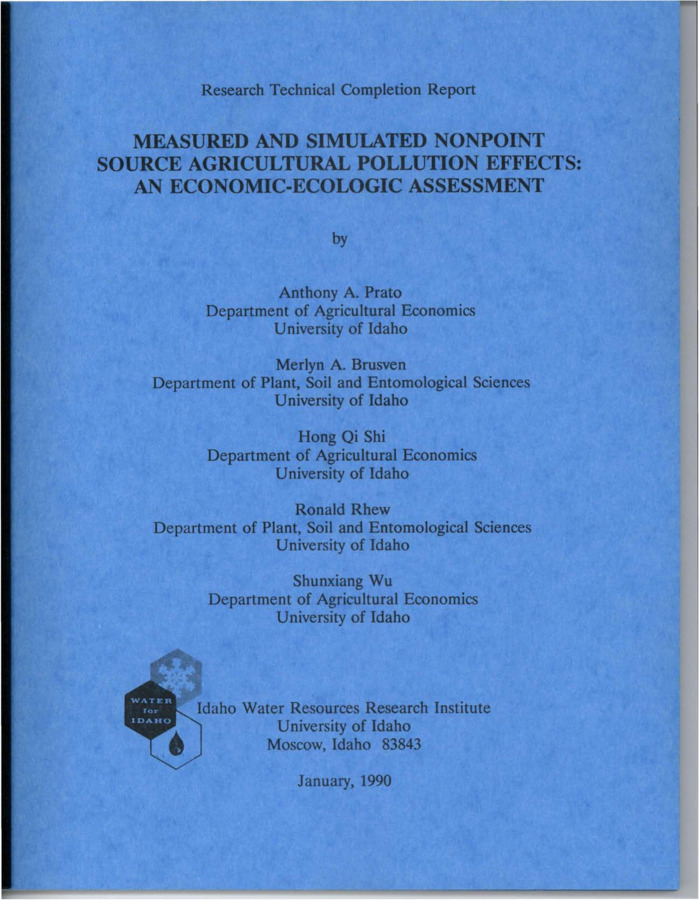PDF
Measured and simulated nonpoint source agricultural pollution effects: an economic-ecological assessment. Research technical completion report, 14-08-0001-G1559-03 Item Info
- Title:
- Measured and simulated nonpoint source agricultural pollution effects: an economic-ecological assessment. Research technical completion report, 14-08-0001-G1559-03
- Authors:
- Prato, Anthony A.; Brusven, Merlyn A.; Shi, Hon Qi; Rhew, Ronald; Wu, Shunxiang
- Date:
- 1990-01
- Description:
- Monitored and simulated economic-ecological impacts from nonpoint source pollution were studied in the Tom Beall Creek watershed along Lapwai, Creek in northern Idaho. Alternative farm practices including riparian vegetation management were evaluated as to their effectiveness in reducing cropland erosion and water pollution. A Geographic Information System (GIS) was used for the spatial analysis of the Tom Beall Creek. Water quality analysis for nutrients (nitrogen species and phosphorus) and suspended sediments revealed generally higher concentrations in Tom Beall Creek, a highly developed agricultural watershed, than the West Fork of the Sweetwater Creek, which was minimally used for agricultural purposes. Highest concentrations occurred during spring runoff and were closely correlated with suspended sediment concentrations, especially phosphorus. Riffle habitats in the West Fork Sweetwater Creek were composed primarily of unimpacted cobble-sized particles (12.7 - 20.54 cm) while similar habitats in Tom Beall Creek were heavily silted; the dominant particles usually ranged below 6.35 cm in diameter. The insect community in Tom Beall Creek exhibited signs of eutrophication and heavy sedimentation by having relatively large densities and reduced species richness when compared to the insect community in the West Fork Sweetwater Creek. Midges (Chironomidae) and elmid beetles (Elmidae) were the dominant insects in Tom Beall Creek, while mayflies and stoneflies were abundant and diverse in the West Fork Sweetwater Creek. Using simulation techniques, this study indicated that good riparian management is more efficient in reducing cropland erosion and water pollution than conservation compliance. If the yield penalties with conservation tillage are permanent and the current resource management system is conventional tillage, contour farming and wheat-pea rotation, then conservation compliance and good riparian management would reduce net farm income in the short term. The income reduction, however, would be more evenly spread among farmers with conservation compliance than with good riparian management. Submitted to the U.S. Geological Survey.
- Subjects:
- geographic information systems suspended sediments water quality macroinvertebrates simulation nutrients economic aspects tillage
- Collection:
- IWRRI
- Series:
- Water for Idaho
- Source:
- Idaho Water Resources Research Institute, University of Idaho
- Identifier:
- IWRRI Number 199010
- Publisher:
- Idaho Water Resources Research Institute, University of Idaho
- Contributing Institution:
- University of Idaho
- Type:
- Text
- Format:
- application/pdf
- Cataloger:
- KIT
- Date Digitized:
- 2017-09-12
- Language:
- eng
Source
- Preferred Citation:
- "Measured and simulated nonpoint source agricultural pollution effects: an economic-ecological assessment. Research technical completion report, 14-08-0001-G1559-03", Idaho Waters Digital Library, University of Idaho Library Digital Collections, https://www.lib.uidaho.edu/digital/iwdl/items/iwdl-199010.html
Rights
- Rights:
- In copyright, educational use permitted. Educational use includes non-commercial reproduction of text and images in materials for teaching and research purposes. For other contexts beyond fair use, including digital reproduction, please contact the University of Idaho Library Special Collections and Archives Department at libspec@uidaho.edu. The University of Idaho Library is not liable for any violations of the law by users.
- Standardized Rights:
- http://rightsstatements.org/vocab/InC-EDU/1.0/

